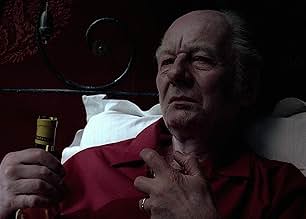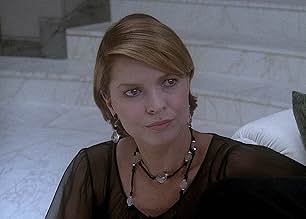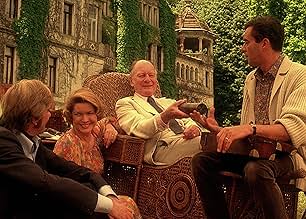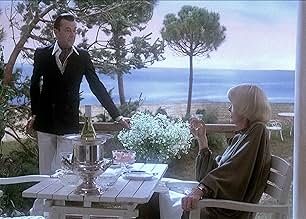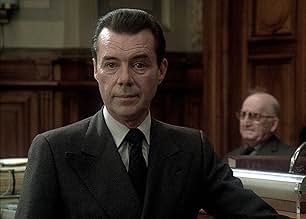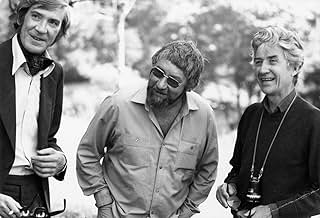CALIFICACIÓN DE IMDb
7.4/10
3.6 k
TU CALIFICACIÓN
Un escritor moribundo basa su último libro en su propia percepción de su familia.Un escritor moribundo basa su último libro en su propia percepción de su familia.Un escritor moribundo basa su último libro en su propia percepción de su familia.
- Dirección
- Guionista
- Elenco
- Premios
- 11 premios ganados y 2 nominaciones en total
Denis Lawson
- Dave Woodford
- (as Dennis Lawson)
- Dirección
- Guionista
- Todo el elenco y el equipo
- Producción, taquilla y más en IMDbPro
Opiniones destacadas
How often do we awake from our dreams in a sweat, not knowing what is real and what is illusion? Especially if we are feverish, our dreams can turn close friends or family members into ogres and hateful creatures (or possibly werewolves) who are bent on our destruction. Such is the case with novelist Clive Langham (John Gielgud), a dying 78 year-old writer who is working on his final novel in the playfully bizarre 1977 English language film, Providence, by Alain Resnais (Hiroshima Mon Amour, Last Year at Marienbad, Muriel). The film depicts how physical and mental anguish can distort our view of reality. A poetic screenplay by playwright David Mercer and powerful performances by John Gielgud, Ellen Burstyn, Dirk Bogarde, Elaine Strich, and David Warner provide strong support.
Clive does not go gentle into that good night. During one horrific night, all the pain of his life and disturbing family relationships boil to the surface. In the novel being played out in the author's mind, his family members, sons Claude (Dirk Bogarde) and Kevin (David Warner), and Claude's wife Sonia (Ellen Burstyn), mysteriously become the main protagonists, assuming roles as prosecutors and defendants, feuding spouses, and extra-marital lovers. As Clive goes deeper into the maelstrom, images become more and more hallucinatory. The denouement is witty, baffling, irritating, and then finally transcendent. To say that the ending is a surprise is a major understatement.
Providence may exasperate you but, if you have patience, it can be a richly rewarding experience. As with all thought provoking and multi-layered films, multiple viewing may be required for full appreciation. Providence was voted the greatest film of the '70s by an international jury of critics and, at Telluride, Norman Mailer called it "the greatest film ever made on the creative process".
Clive does not go gentle into that good night. During one horrific night, all the pain of his life and disturbing family relationships boil to the surface. In the novel being played out in the author's mind, his family members, sons Claude (Dirk Bogarde) and Kevin (David Warner), and Claude's wife Sonia (Ellen Burstyn), mysteriously become the main protagonists, assuming roles as prosecutors and defendants, feuding spouses, and extra-marital lovers. As Clive goes deeper into the maelstrom, images become more and more hallucinatory. The denouement is witty, baffling, irritating, and then finally transcendent. To say that the ending is a surprise is a major understatement.
Providence may exasperate you but, if you have patience, it can be a richly rewarding experience. As with all thought provoking and multi-layered films, multiple viewing may be required for full appreciation. Providence was voted the greatest film of the '70s by an international jury of critics and, at Telluride, Norman Mailer called it "the greatest film ever made on the creative process".
10jfb-4
Don't be put off by what people (including lovers of the film) say about its initially being confusing. Even the first time through, it is madly enjoyable second by second, and it needn't take long to figure out what is going on. In fact, once you know that we are into a dying man's dreams/fantasies/wishes regarding his own family, you have all you need to make sense of virtually everything straight off. By the end, everything has locked into place in a most satisfying way. The contrast between the man's dreams about his family and what you see when they appear in person near the end is one of the most delicious things in the whole of art.
Renais "Providence" has all the hallmarks of cinema at its artistic best. Every component of film making is expertly handled. David Mercer's literary screenplay is a joy to listen to, especially when delivered by the likes of Dirk Bogarde and of course the legendary John Gielgud. The visuals are haunting and perfectly shot with detailed attention to set and costume. Miklos Rosza's soundtrack is in total accordance with the work as a whole, never intrusive, while adding to the rich tapestry that is "Providence". Renais too has assembled a wonderful if somewhat odd cast, which suitably serve this somewhat odd film.
Gielgud plays a dying author whose mind is racing with fantasies peopled by members of his family. His character Clive Langham is depicted as a ribald, sensual, womanizer. Yet his fantasies, making up the bulk of the film, are curiously cold and stark. They are played in bleak settings with an ever present sense of impending catastrophe, though remaining totally devoid of emotion. These imaginings are at completely at odds with their creator. The extreme incongruousness of these fantasies with the character to whom they belong, remains a mystery. This detracts much in the way of emotional impact which is very much lacking in the film, whether intentional or not. The elimination of emotion leaves "Providence" a cold, wonderfully intelligent exercise in the art of film making.
Renais has assembled an intriguing cast headed by the superb Gielgud. Dirk Bogarde whose performances have often been tinged with a cold, sauve superciliousness brings this unpleasant quality to an unparalleled level of extremity. Even the usually over emoting Ellen Burstyn delivers a restrained performance. Elaine Stritch has to be the oddest choice for the role being so contrary to her well known persona. Never has a more unlikely coupling been presented than Stitch and Bogarde as lovers. Yet in this emotionless void, even that becomes acceptable.
"Providence" is a highly unusual, important film and shouldn't be missed by the discerning film enthusiast. Yet despite the wealth of cinematic craft on display it remains an unsatisfying experience.
Gielgud plays a dying author whose mind is racing with fantasies peopled by members of his family. His character Clive Langham is depicted as a ribald, sensual, womanizer. Yet his fantasies, making up the bulk of the film, are curiously cold and stark. They are played in bleak settings with an ever present sense of impending catastrophe, though remaining totally devoid of emotion. These imaginings are at completely at odds with their creator. The extreme incongruousness of these fantasies with the character to whom they belong, remains a mystery. This detracts much in the way of emotional impact which is very much lacking in the film, whether intentional or not. The elimination of emotion leaves "Providence" a cold, wonderfully intelligent exercise in the art of film making.
Renais has assembled an intriguing cast headed by the superb Gielgud. Dirk Bogarde whose performances have often been tinged with a cold, sauve superciliousness brings this unpleasant quality to an unparalleled level of extremity. Even the usually over emoting Ellen Burstyn delivers a restrained performance. Elaine Stritch has to be the oddest choice for the role being so contrary to her well known persona. Never has a more unlikely coupling been presented than Stitch and Bogarde as lovers. Yet in this emotionless void, even that becomes acceptable.
"Providence" is a highly unusual, important film and shouldn't be missed by the discerning film enthusiast. Yet despite the wealth of cinematic craft on display it remains an unsatisfying experience.
This is one of the strangest movies I know. French intellectual aesthete meets contemporary British playwright - this should be the title of Providence. When two completely different cultures meet for a common project, the risk of failure is enormous. But in this case something interestingly and uniquely hilarious was created. Providence is a feverish dream that was successfully created for the screen.
The dream sequences of an old, dying writer, played by John Gielgud are absurd in a very British way. John Gielguds's upper class "king's English" voice-over adds effectively to its strangeness. As usual in contemporary British plays, sex and bowel movements are of the utmost importance . no, the script as a whole is neither very original nor particularly funny. I liked the incongruous, illogical situations though. Every now and then, in the most impossible situations, a strange, sickly looking football player (he seems to have fallen off Monty Python's Flying Circus) jogs limply past.
Director Alain Resnais is responsible for the dreamscapes, and they make Providence worth watching. Real settings are artfully distorted into haunting, surreal spatial sequences. Foreground and background, light and darkness, different textures and beautiful color arrangements are expertly arranged into a world of its own that is never too far from reality. One is sometimes reminded of Magritte's surrealistic paintings. Strange sounds add to the almost psychedelic effect the dream scenes have.
The acting is remarkable, especially Dirk Bogarde as the writer's slick, cynical «dream son» gives an outstanding performance.
The dream sequences of an old, dying writer, played by John Gielgud are absurd in a very British way. John Gielguds's upper class "king's English" voice-over adds effectively to its strangeness. As usual in contemporary British plays, sex and bowel movements are of the utmost importance . no, the script as a whole is neither very original nor particularly funny. I liked the incongruous, illogical situations though. Every now and then, in the most impossible situations, a strange, sickly looking football player (he seems to have fallen off Monty Python's Flying Circus) jogs limply past.
Director Alain Resnais is responsible for the dreamscapes, and they make Providence worth watching. Real settings are artfully distorted into haunting, surreal spatial sequences. Foreground and background, light and darkness, different textures and beautiful color arrangements are expertly arranged into a world of its own that is never too far from reality. One is sometimes reminded of Magritte's surrealistic paintings. Strange sounds add to the almost psychedelic effect the dream scenes have.
The acting is remarkable, especially Dirk Bogarde as the writer's slick, cynical «dream son» gives an outstanding performance.
10davidf33
A double header of complex imagination (first part) and painful recrimination (second part) in this film of deep feeling and hurt seen through the eyes of the dying author (John Gielgud). David Mercer's script includes all his life long angst of the relationship of father and son, although now in his final years fought out with more complex and participating female characters in the ghost of his dead wife, who doubles as his son's mistress (Elaine Stritch) and daughter-in-law (Ellen Burstyn).
The acting is pure poetry with John Geilgud at his refined best as the drunken and dying author in part celebrating his life of drunken womanising and in part regretting the pain that he has caused, in particular to his family. Dirk Borgarde performing the impossible task of being two imaginary characters and one real one with seemless effort. As the son of the dying author he carries all the pain and hatreds of the dying father both in the old man's fantasy and in his real life of inherited disillusionment. His relationship with his wife and mistress (in practice his mother! complex eh!) changes from the deeply loving to the perceive accusatory of the old man's increasingly drunken imagination.
Ellen Burstyn gives one of her finest film performances as the long suffering wife ,but in the end all the plaudits go to the writer. The style may be only that of the one-liner but each of them hits as an aphorism from the greatest of philosophical minds. The revolving characters of the final part of the authors dreaming make a bewildering tapestry of the imagination.
A fabulous movie, but one that will take many viewings to actually comprehend the complexities of it. Set that video!!
The acting is pure poetry with John Geilgud at his refined best as the drunken and dying author in part celebrating his life of drunken womanising and in part regretting the pain that he has caused, in particular to his family. Dirk Borgarde performing the impossible task of being two imaginary characters and one real one with seemless effort. As the son of the dying author he carries all the pain and hatreds of the dying father both in the old man's fantasy and in his real life of inherited disillusionment. His relationship with his wife and mistress (in practice his mother! complex eh!) changes from the deeply loving to the perceive accusatory of the old man's increasingly drunken imagination.
Ellen Burstyn gives one of her finest film performances as the long suffering wife ,but in the end all the plaudits go to the writer. The style may be only that of the one-liner but each of them hits as an aphorism from the greatest of philosophical minds. The revolving characters of the final part of the authors dreaming make a bewildering tapestry of the imagination.
A fabulous movie, but one that will take many viewings to actually comprehend the complexities of it. Set that video!!
¿Sabías que…?
- TriviaSir John Gielgud, who spent most of his career on the stage, considered this movie and the television mini-series Brideshead Revisited (1981) to be his only two screen appearances of which he was genuinely proud.
- Citas
Clive Langham: Don't you think to have only one bastard after sixty years of action is almost tantamount to self denial?
- Créditos curiososThe National Philharmonic Orchestra is misspelled as National Philarmonic Orchestra in the opening credits.
- ConexionesFeatured in Zomergasten: Episode #7.4 (1994)
Selecciones populares
Inicia sesión para calificar y agrega a la lista de videos para obtener recomendaciones personalizadas
Detalles
- Tiempo de ejecución1 hora 50 minutos
- Color
- Relación de aspecto
- 1.78 : 1(original ratio)
Contribuir a esta página
Sugiere una edición o agrega el contenido que falta

Principales brechas de datos
By what name was Providence (1977) officially released in India in English?
Responda
